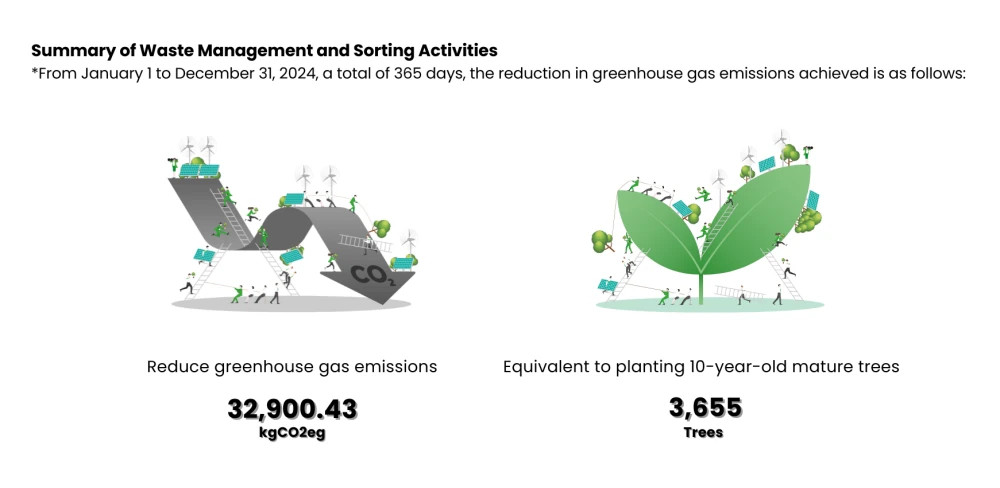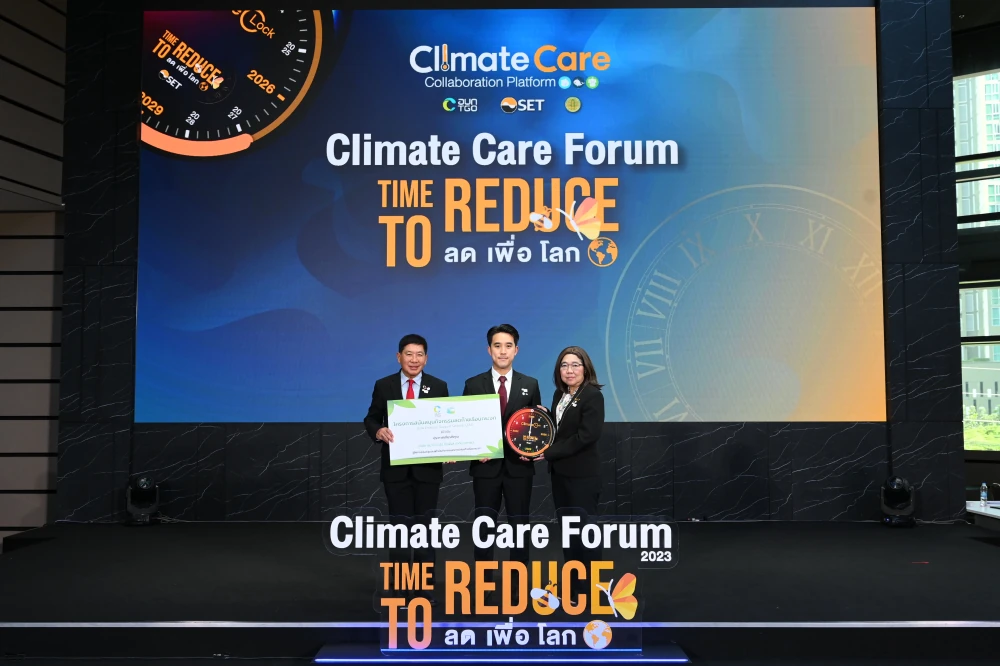Climate Change

Our Commitment
Jaymart Group Holdings Public Company Limited has demonstrated its commitment to addressing climate change impacts arising from its business operations across all processes and supply chains, both directly and indirectly.
This includes assessing risks and opportunities associated with climate change and implementing effective plans to manage such changes in terms of physical impacts and structural adjustments that may affect the company.
The company places great importance on actions that help reduce greenhouse gas emissions and support the achievement of climate change goals at both national and international levels. At the 27th United Nations Climate Change Conference (COP27) held in 2022, emphasis was placed on the critical goal of limiting global temperature rise to no more than 2 degrees Celsius. This aligns with the strategies Jaymart Group Holdings Public Company Limited is actively pursuing to develop and improve internal processes to effectively reduce greenhouse gas emissions and promote renewable energy usage.
Furthermore, global warming significantly impacts business operations, such as natural disasters including storms, floods, or landslides, which could disrupt operations and resource management. Jaymart Group Holdings Public Company Limited acknowledges these impacts and has implemented various measures to address these challenges, such as utilizing technologies that reduce energy consumption, promoting the use of renewable energy, and supporting initiatives related to climate change adaptation and mitigation.
The organization actively supports global goals and measures to mitigate climate change impacts and implements environmentally friendly practices. These initiatives reflect Jaymart Group's dedication to being part of the solution to global warming and climate change issues, while also enhancing social and environmental responsibility across all business processes within the organization.
Supporting The SDGs Goal
Advancing global sustainability through alignment with the UN SDGs.
Stakeholders Directly Impacted
Goals
Short-term
- Reduce the amount of electricity purchased from external sources by 3% compared to the previous year.
- Commit to reducing the annual greenhouse gas emission rate by at least 3% compared to the business-as-usual scenario by 2030.
Long-term
- Strive for Carbon Neutrality by 2050.
- Aim to achieve Net Zero Emissions by 2065.
Performance Highlights
The amount of electricity purchased from external sources at Jaymart Headquarters in 2024 was
The total electricity generated from the Solar Rooftop on the headquarters building in 2023 – 2024 amounted to
In 2024, greenhouse gas emissions from operations at Jaymart Headquarters decreased by
In 2023-2024, the data was verified by a Certified body under
To address the energy crisis and its potential impacts, the company prioritizes efficient and sustainable energy management by aiming to reduce the consumption of non-renewable energy and dependency on external energy sources. The company's commitment to tackling this issue aligns with the goals set forth by the United Nations Framework Convention on Climate Change (UNFCCC), which seeks to address global climate change caused by greenhouse gas emissions resulting from human activities and excessive energy use.
In terms of actions, the company has initiated various projects focusing on energy conservation and reducing greenhouse gas emissions. One key initiative is increasing the proportion of renewable energy usage, particularly solar energy, which is sustainable and unaffected by natural resource scarcity.
Additionally, the company has implemented energy conservation projects emphasizing optimal and efficient energy use. These projects aim to reduce energy consumption in business activities, such as electricity usage for computer systems, air conditioning, and building lighting systems. This is achieved through improved energy management, minimizing unnecessary energy loss, and adopting energy-efficient technologies in equipment to reduce unnecessary energy consumption.
Furthermore, the company has introduced measures to reduce the use of devices or equipment that are highly polluting or consume excessive energy, aligning with environmental conservation goals and minimizing environmental impacts resulting from the company’s energy use. These efforts ensure a continuous reduction in purchased energy consumption while promoting activities related to carbon emission reductions whenever possible.
Energy Consumption Data for Jaymart Headquarters (as of December 31, 2024)
This table can be scrolled horizontally
| Category | Unit | 2023 | 2024 |
|---|---|---|---|
| Total Non-Renewable Energy Consumption (Energy Purchased from External Sources) | kWh | 2,039,987 | 1,795,000 |
| Total Renewable Energy Consumption | kWh | 210,628 | 242,700 |
| Total Energy Consumption | kWh | 2,250,615 | 2,037,700 |
Note:
- The amount of electricity purchased from external sources at Jaymart Headquarters in 2024 was 1,795,000 kWh, representing a 12.00% reduction compared to the previous year (2023: 2,039,987 kWh).
- The electricity generated from solar energy (Solar Rooftop) in 2024 totaled 242,700 kWh, accounting for 11.91% of the total electricity consumption in 2024, resulting in an estimated cost savings of 1.06 million baht.
Summary of Greenhouse Gas Emissions at Jaymart Headquarters (as of December 31, 2024)
This table can be scrolled horizontally
| Category | Scope | Unit | 2023 | 2024 |
|---|---|---|---|---|
| Total greenhouse gas emissions at headquarters | Scope 1 - 3 | tCO2e | 2,144.51 | 1,053.65 |
| Direct greenhouse gas emissions | Scope 1 | tCO2e | 1,124.72 | 156.33 |
| Indirect greenhouse gas emissionsEmissions from Imported Energy Location-based | Scope 2 | tCO2e | 1,019.79 | 897.32 |
| Other indirect greenhouse gas emissions | Scope 3 | tCO2e | N/A | N/A |
| Used of tap waterSeparately Report (R-22) | tCO2e | 0 | 0 |
*Certified to ISO 14064-1:2018 standard.
Organization Partners in Waste Management and Greenhouse Gas Management

Management Approach
The company recognizes the importance of greenhouse gas management and has initiated various projects to support the reduction of emissions from activities across its business processes. As part of these efforts, the company launched the JMART Go Green campaign to promote the reduction of resource and energy usage within the organization, increase the proportion of renewable energy consumption over fossil fuels, and adopt technologies to minimize the use of natural resources to support greenhouse gas reduction. Additionally, the company has continuously participated in the Care the Bear and Care the Whale projects in collaboration with the Stock Exchange of Thailand, demonstrating its efforts to reduce greenhouse gas emissions from organizational activities. These initiatives aim to meet the company's targets of achieving Carbon Neutrality by 2030 and Net Zero Emissions by 2050.
In terms of actions, the company has launched projects focusing on energy conservation and reducing greenhouse gas emissions. One key initiative is increasing the share of renewable energy, particularly solar energy, which is sustainable and unaffected by natural resource shortages. Efforts to systematically reduce greenhouse gas emissions include integrating renewable energy into the organization, such as installing solar rooftop systems to reduce reliance on fossil fuels and promote environmentally friendly energy usage.
The company has also implemented energy conservation projects emphasizing efficiency and optimal utilization. These projects focus on reducing energy consumption in various business activities, such as electricity use for computer systems, air conditioning, and building lighting systems. This is achieved through efficient energy management, minimizing unnecessary energy loss, and adopting energy-saving technologies in equipment. Furthermore, the company is reducing the use of high-energy-consuming or polluting devices to align with its environmental conservation goals and minimize environmental impacts from its energy use. These efforts aim to maintain a continuous reduction in purchased energy consumption and promote activities that reduce greenhouse gas emissions wherever possible.
Regarding resource management, the company has developed a comprehensive waste management system to achieve Zero Waste status. This involves reducing materials that generate waste, such as promoting the elimination of single-use plastics, and encouraging waste segregation for reuse or recycling. Additionally, the company fosters environmental awareness among employees through educational programs and activities aimed at encouraging behavioral changes to reduce daily greenhouse gas emissions.
Through these measures, the company strives to create sustainability in every operational process. This is not only to minimize environmental impacts but also to raise awareness and shared responsibility among employees and all stakeholders. The ultimate goal is to move toward a sustainable and environmentally friendly future.




